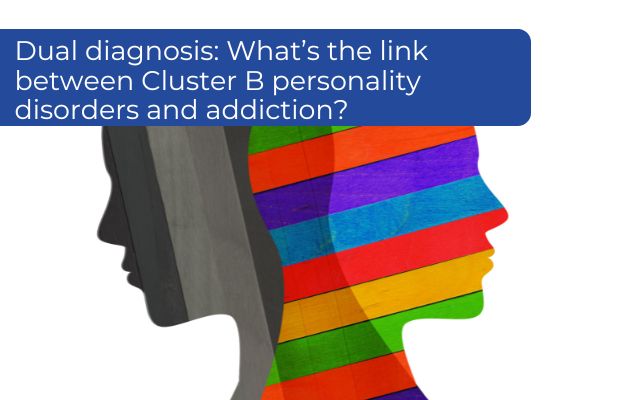We’ve looked at the link between addiction and personality disorders more generally but now it’s time to get specific and look at each disorder in detail, and more specifically, Cluster B personality disorders. Personality disorders are grouped into three clusters. Read on for an in-depth look at the science behind the link between Cluster B personality disorders and substance abuse.

What are Cluster B personality disorders?
A personality disorder is a mental health condition that affects the way a person thinks, feels and behaves, making it difficult to deal with emotions and interact appropriately with others.
Common features of Cluster B personality disorders dramatic, excessively emotional, erratic and unpredictable thoughts and actions. They include borderline personality disorder, antisocial personality disorder, histrionic personality disorder and narcissistic personality disorder. People with a Cluster B diagnosis often need more attention than others and have trouble regulating their emotions as well as maintaining interpersonal relationships. They often turn to harmful coping strategies such as self-harm, problematic eating behaviours and drug or alcohol abuse. Dual diagnosis is a term used when an addiction co-occurs with another mental health condition.
When we found out that our daughter had an addiction problem, we were devastated and just wanted to get her the best possible help. After some research, we came across Changes. We couldn't have asked for better.
I'm proud of the family we are at Changes and the work we do because it comes from our heart and care. Due to that care, we change lives. Changes Treatment Centre is where we make change without fear.
My first interaction with Changes gave me peace of mind. I knew that they would help. Thank you for looking after my son so well. You made a world of difference, not only in his life but also mine.
Filled with love and rules, Changes will get you on the straight and narrow and help you find the real you. The structure and support they provide are truly life-changing, I am a very different person today.
If Amy W wanted to go to Rehab then it would have been Changes! I had no idea what rehabilitation and treatment was but when I arrived, I didn't realise how broken and in need of repair I was.
The science behind the four Cluster B personality disorders and addiction
Borderline personality disorder
Common features of borderline personality disorder are:
- Impulsivity
- Risky behaviour like unsafe sex, gambling, binge eating and drug abuse
- Unstable self-image
- Intense, yet unstable, personal relationships
- Mood swings that are sometimes extreme and that are often a reaction to interpersonal stress
- Suicidal behaviour
- Threats of self-injury as well as active self-harm
- Intense fear of being alone or abandoned
- Persistent feelings of emptiness
- Frequent and intense outbursts of anger
- Stress-related paranoia
- Rigid ‘black-or-white’ thinking
This is the most common personality disorder found amongst addicts and alcoholics (apart from antisocial personality disorder). The United States’ National Institute of Mental Health estimates that up to 40% of people with borderline personality disorder have a substance use disorder.
Other research has shown that up to half of people with borderline personality disorder have a history of abusing prescription drugs.
People with borderline personality disorder are thought to turn to drugs to cope with symptoms of the disorder, especially feelings of emptiness and loneliness. However, drugs and alcohol have been found to worsen symptoms of borderline personality disorder specifically impulsivity, destructive behaviours and mood swings.
Diagnosing borderline personality disorder in an addict or alcoholic is difficult because symptoms often overlap. This is why it is important for a psychiatrist experienced in treating dual diagnosis patients to assess clients coming into addiction treatment.
Antisocial personality disorder
This personality disorder is characterised by:
- A disregard for others’ needs or feelings
- Continuous unethical behaviours (such as stealing, lying and conning people)
- Problems with the law
- Violating the rights of others
- Aggressive and violent behaviour
- Impulsivity
- Being irresponsible
- A lack of empathy for others
- A lack of remorse for problematic behaviour
Addiction often occurs alongside a diagnosis of antisocial personality disorder: About 70% of males with severe alcohol use disorders are also diagnosed with antisocial personality disorder.
The link between addiction and this type of personality disorder is strong. Some research suggests that 9 in ten people diagnosed with antisocial personality disorder have had a substance abuse issue at some point in their lifetime.
It is thought that many of the symptoms of antisocial personality disorder and addiction are similar and are a reason these conditions often occur together. These similar symptoms include impulsivity, self-centredness, a lack of concern for the rights of others and difficulties with delayed gratification.
It is important to have an experienced psychiatrist consult with people entering addiction treatment to diagnose co-occurring antisocial personality disorder as well as to differentiate between the symptoms associated with this personality disorder and addiction.
Histrionic personality disorder
This personality disorder is marked by:
- Constantly seeking attention (through being overly emotional, dramatic or sexually provocative)
- Dramatic verbal statements
- Being easily influenced by others
- Rapid changes in emotions
- Excessive concern with physical appearance
- A distorted view about the strength of their interpersonal relationships
In a study on clients attending an addiction outpatient programme, it was found that 1.5% fit the diagnostic criteria for histrionic personality disorder.
A person with this type of personality disorder might turn to drugs to alleviate emotional symptoms or to get attention from others. A person with histrionic personality disorder will likely cause chaos and these situations will be exacerbated by substance use.
For people with this dual diagnosis, it is important to treat this mental disorder and the addiction simultaneously to increase the chances of the client remaining sober in the long-term. An experienced psychiatrist is needed to both diagnose and treat this co-occurring disorder in clients receiving treatment for addiction.
Narcissistic personality disorder
Common features of narcissistic personality disorder include:
- A belief that they are more important or special than others
- Fantasies about power, success and attractiveness
- Failure to acknowledge others’ needs and emotions
- Exaggerating their achievements or talents
- Expectation of praise and admiration
- Arrogance
- A lack of empathy
- Often taking advantage of others and expecting favours
- Envy of others as well as a belief that they are the object of envy
Research suggests that there is a strong link between narcissistic personality disorder and addiction. It has been estimated that approximately 22% of people with this disorder also have an alcohol problem while 9% have a drug addiction.
Much of the research on the link between this disorder and addiction notes the increased danger related to this particular dual diagnosis. People with narcissistic personality traits often believe they are able to handle drugs and alcohol better than those around them which can lead to taking substances in higher volumes increasing the risk of overdose and other severe health consequences.
Narcissistic traits such as a lack of empathy and a perception of not being vulnerable to the negative consequences of drug abuse are common amongst addicts. It is therefore important that an experienced mental health professional is used to differentiate narcissistic personality disorder from the symptoms of addiction in order to make an accurate dual diagnosis. Both the personality disorder and the addiction need to be addressed at the same time during rehabilitative treatment to give the patient a better chance of achieving long-term sobriety.
Looking at the link between addiction and Cluster B personality disorders (borderline, histrionic, antisocial and narcissistic personality disorder), backed by scientific research. Are you looking for addiction treatment that uses a dual diagnosis approach? Contact us today.
Read more on the relationship between:
- Personality disorders and addiction
- Cluster A personality disorders and addiction
- Cluster C personality disorders and addiction
Do you want to learn more about dual diagnosis? Read:
- Dual diagnosis & Bipolar disorder
- Dual diagnosis & Depression
- Dual diagnosis & Anxiety
- Dual diagnosis & ADHD
- Dual diagnosis & PTSD
Cluster B personality disorders may heighten addiction risk through impulsivity and emotional instability, revealing why specialised treatment and support matter.. Changes team counsellors are here to help you.Cluster B Personality Disorders Increase Addiction Risk










